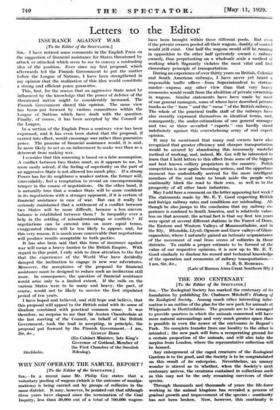WHY NOT OPERATE THE SAMUEL REPORT ?
[To the Editor of the SPECTATOR.]
Sia,—In a recent issue Mr. Philip Gee states that a voluntary pooling of wagons (which is the outcome of amalga- mations) is being carried out by groups of collieries in the same district. It may, however, be pointed out that although three years have elapsed since the termination of the Coal Inquiry, less than 30,000 out of a total of 700,000 wagons
have been brought within these different pools. But evert if the private owners pooled all their wagons, duality of control would still exist. One half the wagons would still be running in opposition to the other half (privately owned v. railway owned), thus perpetuating on a wholesale scale a method of working which flagrantly violates the most vital and first elementary principle of transportation.
During an experience of over thirty years on British, Colonial and South American railways, I have never yet heard a responsible traffic officer—from Superintendent to station. master—express any other view than that very heavy economies would result from the abolition of private ownership in wagons. Similar statements have been made by most of our general managers, some of whom have described private trucks as the " bane " and the " curse " of the British railways. The whole of the practical traffic staff of the railways have also recently expressed themselves in identical terms, and, consequently, the under-estimations of one general manager and two or three so-called " experts " can hardly stand indefinitely against this overwhelming array of real expert opinion.
It may be mentioned that many coal owners have also recognized that greater efficiency and cheaper transportation would be secured by abandoning this immensely wasteful method of working, and, indeed, Mr. Gee will be interested to learn that I hold letters to this effect from some of the biggest and best known colliery proprietors in the country. Polish competition is now again becoming serious, and the opportune moment has undoubtedly arrived for the more intelligent members of the coal trade to brush aside the people who continually block the road to their own, as well as to the prosperity of all other basic industries.
May I add here a comment on the letter appearing last week? The statements made by Mr. E. T. Good respecting British and foreign railway rates and conditions are misleading. Al- though he also jumps to the conclusion that my railway ex- perience is confined to South America, and is relatively value- less on that account, the actual fact is that my first ten years were spent at several different stations in the Forest of Dean, the Eastern and Western Valleys of Monmouthshire, and in the Ely, Rhondda, Llynfi, Ogmore and Garw valleys of Glam- organshire, where I naturally gained an intimate acquaintance of the movement of coal from scores of collieries in those districts. To enable a proper estimate to be formed of the value of our respective opinions, it is now up to Mr. E. T. Good similarly to disclose his record and technical knowledge of the operation and economics of railway transportation.— I am, Sir, &c., E. R. B. RoaEirrs. (Late of Buenos Aires Great Southern Rly.)










































 Previous page
Previous page